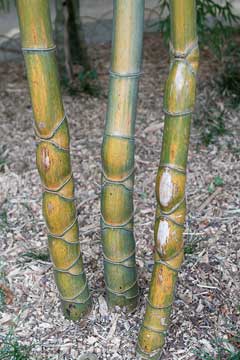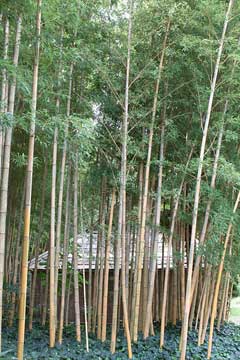 |
|
http://commons.wikimedia.org/wiki/User:Okki |
 |
| http://commons.wikimedia.org/wiki/User:Okki |
Translate this page:
Summary
Phyllostachys pubescens J.Houz. is a synonym of Phyllostachys edulis (Carrière) J.Houz. Moso Bamboo (Phyllostachys edulis) has edible young shoots harvested in spring and is widely used in Asian cuisine. The shoots are boiled or cooked in various dishes. They require regular watering during the growing season but can tolerate periods of drought. They are hardy to -10 °C (14°F). When used as a hedge, once the culms (poles) have been cut shorter, they will not re-grow taller from that cut point. Bamboos are versatile and valuable plants that can be incorporated into a food forest in several ways. Depending on the species, bamboo can grow very tall and form a dense thicket, making them a valuable addition to the vertical and understory layers of the food forest. Bamboos are typically classified as tall shrubs or trees, depending on their growth habits and species. Bamboos can be used in various ways in a food forest: providing structure and support for climbing plants and vines; some bamboo species grow tall enough to make a canopy layer in the food forest, providing shade and shelter to plants growing beneath them; many bamboo species have edible shoots, a popular ingredient in many Asian cuisines; and bamboo roots can help to break up compacted soil and bring nutrients to the surface, improving soil health and fertility.
Because bamboo can increase and spread aggressively, choosing and managing a suitable species is essential to prevent it from becoming invasive. Some bamboo species, such as clumping bamboo, are better suited to a food forest environment as they tend to stay in place and do not spread as rapidly as running bamboo species.
Several species of bamboo are edible. Bamboo shoots are common in many Asian cuisines, including Chinese, Japanese and Thai. Some bamboo species’ young, tender shoots can be harvested and prepared as a vegetable and are known for their crisp texture and delicate flavour. However, it is essential to note that not all bamboo species are edible, and some can even be toxic. Additionally, bamboo shoots must be appropriately prepared before consumption, as they contain natural toxins that can be harmful if not cooked or processed correctly.
Although typically associated with tropical and subtropical environments, several edible bamboo species can grow in drier conditions and need adequate water and care.
Physical Characteristics

 Phyllostachys edulis is an evergreen Bamboo growing to 8 m (26ft 3in) at a fast rate.
Phyllostachys edulis is an evergreen Bamboo growing to 8 m (26ft 3in) at a fast rate.
See above for USDA hardiness. It is hardy to UK zone 7. It is in leaf all year. The species is hermaphrodite (has both male and female organs) and is pollinated by Wind. The plant is self-fertile.
It is noted for attracting wildlife.
Suitable for: light (sandy), medium (loamy) and heavy (clay) soils. Suitable pH: mildly acid, neutral and basic (mildly alkaline) soils. It can grow in semi-shade (light woodland). It prefers moist soil.
UK Hardiness Map
US Hardiness Map
Synonyms
P. mitis. P. pubescens. H. de Lehar. Bambusa edulis. Sinarundinaria pubescens.
Plant Habitats
Woodland Garden Sunny Edge; Dappled Shade; Shady Edge;
Edible Uses
Edible Parts: Shoots Stem
Edible Uses:
Young shoots - cooked[1, 11, 105]. Very palatable when cooked but acrid raw[25, 74, 183]. Not of the highest quality, but their large size makes them very popular[195]. Extensively eaten in China, they are usually cooked in one change of water[183]. The shoots are harvested in the spring when they are about 8cm above the ground, cutting them about 5cm below soil level. The dormant young shoots, harvested in the winter before they emerge above the ground, are especially relished as a delicacy[183, 195].
References More on Edible Uses
Medicinal Uses
Plants For A Future can not take any responsibility for any adverse effects from the use of plants. Always seek advice from a professional before using a plant medicinally.
Antiemetic Antirheumatic
The leaves are used in the treatment of arthritic inflammations[218]. The sheaths of the stem are used in the treatment of nausea and sour stomach[218].
References More on Medicinal Uses
The Bookshop: Edible Plant Books
Our Latest books on Perennial Plants For Food Forests and Permaculture Gardens in paperback or digital formats.

Edible Tropical Plants
Food Forest Plants for Hotter Conditions: 250+ Plants For Tropical Food Forests & Permaculture Gardens.
More

Edible Temperate Plants
Plants for Your Food Forest: 500 Plants for Temperate Food Forests & Permaculture Gardens.
More

More Books
PFAF have eight books available in paperback and digital formats. Browse the shop for more information.
Shop Now
Other Uses
Containers Fodder Pipes Wood
Agroforestry uses: used for erosion control, as a windbreak, and as a source of timber for construction and crafts. It can also be integrated into agroforestry systems as a shade provider and ground cover. The canes make good water pipes[74], they are also used for household utensils etc[25]. The short internodes at the lower end of the cane are used as flasks, vases etc[74]. Although the wood is relatively soft, the canes are much used for heavy construction, weaving various types of handicrafts and paper making[195]. The rhizomes are used as walking sticks and umbrella handles. Carbon farming - Industrial Crop: biomass. Fodder: bank. Other Systems: multistrata.
Special Uses
Carbon Farming Food Forest
References More on Other Uses
Cultivation details
Industrial Crop: Biomass Management: Managed Multistem Minor Global Crop Other Systems: Multistrata
Requires a rich damp soil in a sheltered position[200] with plenty of moisture in the growing season[162]. Likes abundant sunshine[11]. A fairly cold-hardy plant, succeeding outdoors in many areas of Britain. It tolerates temperatures down to about -15°c according to one report, but the plants are slow to recover from damage caused by cold weather[11]. They also dislike prolonged exposure to hard frosts[200]. Plants grow well in Cornwall making a very good sized clump. The young shoots are very fast growing, up to 30cm per day[11], and are produced from late April[25]. The rootstock is running but it is practically static in cool climates[25]. This species is notably resistant to honey fungus[200]. Plants only flower at intervals of many years. When they do come into flower most of the plants energies are directed into producing seed and consequently the plant is severely weakened. They sometimes die after flowering, but if left alone they will usually recover though they will look very poorly for a few years. If fed with artificial NPK fertilizers at this time the plants are more likely to die[122]. Young plants can be difficult to establish, new plantings only grow slowly at first and often fail completely if soil and water conditions are less than the best[195]. This species, but especially its cultivar 'Pubescens'[266] is extensively cultivated for its edible young shoots and other uses in China and Japan[46, 183, 266], it is the most commonly cultivated bamboo in China and the second most common in Japan[195]. This is a good companion species to grow in a woodland because the plants are shallow rooted and do not compete with deep rooted trees[195]. Carbon Farming - Cultivation: minor global crop. Management: managed multistem. Moso bamboo is self-fertile, allowing it to produce seeds without the need for cross-pollination. Moso bamboo is known for its rapid growth, capable of growing several feet in just a single day under optimal conditions. It typically reaches full height in about 3 to 5 years. Moso bamboo can be harvested for shoots in spring, typically from April to June. The culms (stalks) are usually harvested in late summer to early autumn.
Moso bamboo has a unique flowering cycle that can vary; it flowers every 30 to 120 years, often in late summer. The timing is not consistent and can be influenced by environmental factors.
Carbon Farming
-
Industrial Crop: Biomass
Three broad categories: bamboos, resprouting woody plants, and giant grasses. uses include: protein, materials (paper, building materials, fibers, biochar etc.), chemicals (biobased chemicals), energy - biofuels
-
Management: Managed Multistem
Regularly removing some multiple stems. A non-A non-destructive management systems maintaining the soil organic carbon.
-
Minor Global Crop
These crops are already grown or traded around the world, but on a smaller scale than the global perennial staple and industrial crops, The annual value of a minor global crop is under $1 billion US. Examples include shea, carob, Brazil nuts and fibers such as ramie and sisal.
-
Other Systems: Multistrata
Multistrata agroforests feature multiple layers of trees often with herbaceous perennials, annual crops, and livestock.
References Carbon Farming Information and Carbon Sequestration Information
Temperature Converter
Type a value in the Celsius field to convert the value to Fahrenheit:
Fahrenheit:
The PFAF Bookshop
Plants For A Future have a number of books available in paperback and digital form. Book titles include Edible Plants, Edible Perennials, Edible Trees,Edible Shrubs, Woodland Gardening, and Temperate Food Forest Plants. Our new book is Food Forest Plants For Hotter Conditions (Tropical and Sub-Tropical).
Shop Now
Plant Propagation
Seed - surface sow as soon as it is ripe in a greenhouse at about 20°c. Do not allow the compost to dry out. Germination usually takes place fairly quickly so long as the seed is of good quality, though it can take 3 - 6 months. Grow on in a lightly shaded place in the greenhouse until large enough to plant out. Seed is rarely available. Division in spring as new growth commences. Divisions from the open ground do not transplant well, so will need careful treatment and nurturing under cover in pots until at least late spring[238]. Division is best carried out in wet weather and small divisions will establish better than large clumps[238]. Another report says that you can take large divisions from established clumps and transfer them straight to their permanent positions, misting or drenching them frequently until they are established[200]. Basal cane cuttings in spring.
Other Names
If available other names are mentioned here
Running Bamboo. Moso bamboo, Hairy bamboo.Chiang-nan-chu, Mao tsoh, Moso.
Native Range
Asia, Australia, Brazil, China, Indochina, Japan, SE Asia, South America, Tasmania, Vietnam.
Weed Potential
Right plant wrong place. We are currently updating this section.
Please note that a plant may be invasive in one area but may not in your area so it's worth checking.
None Known
Conservation Status
IUCN Red List of Threatened Plants Status :

Growth: S = slow M = medium F = fast. Soil: L = light (sandy) M = medium H = heavy (clay). pH: A = acid N = neutral B = basic (alkaline). Shade: F = full shade S = semi-shade N = no shade. Moisture: D = dry M = Moist We = wet Wa = water.
Now available:
Food Forest Plants for Mediterranean Conditions
350+ Perennial Plants For Mediterranean and Drier Food Forests and Permaculture Gardens.
[Paperback and eBook]
This is the third in Plants For A Future's series of plant guides for food forests tailored to
specific climate zones. Following volumes on temperate and tropical ecosystems, this book focuses
on species suited to Mediterranean conditions—regions with hot, dry summers and cool, wet winters,
often facing the added challenge of climate change.
Read More
Expert comment
Author
(Carrière.)J.Houz.
Botanical References
11200266
Links / References
For a list of references used on this page please go here
Readers comment